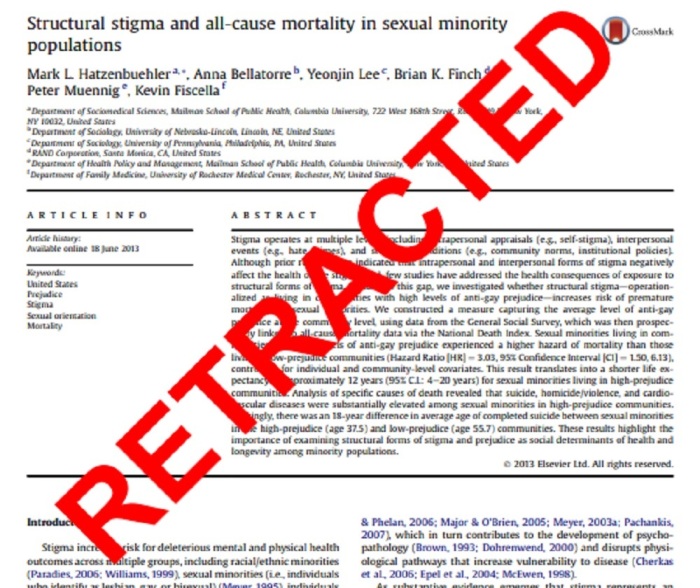Journal retracts study claiming LGBT people die earlier in prejudiced communities

A mid-2000’s study linking anti-gay prejudice to shorter lifespans for lesbians, gays, and bisexual individuals has been retracted on grounds that it was an “erroneous” finding.
The study “Structural stigma and all-cause mortality in sexual minority populations” was conducted by researchers from Columbia University’s Mailman School of Public Health and was published by the peer-reviewed academic journal Social Science & Medicine in February 2014.
The study purported to have found that lesbian, gay, and bisexual people who live in communities with high levels of anti-gay sentiment tend to die earlier than lesbians, gays and bisexuals who live in communities that are more tolerant of their lifestyles.
The report suggested that lesbians, gays and bisexuals living in communities with a “high prejudice” to their lifestyles lived an average 12 years less than those living in more tolerant communities.
The study stated that analysis of specific causes of death revealed that suicide, homicide and cardiovascular diseases “were substantially elevated among sexual minorities in high-prejudice communities.”
The researchers, led by sociomedical sciences professor Mark Hatzenbuehler, indicated that an added stress that accompanies living in areas of lesser tolerance to LGBT lifestyles can cause earlier deaths.
The study had been promoted by institutions such as the National LGBT Health Education Center and was covered in a number of news outlets such as Reuters and ThinkProgress.
However, the University of Texas at Austin sociology professor and author Mark Regnerus voiced concern with the study. In 2017, the same peer-reviewed journal that published the study published a piece by Regnerus detailing his attempts to run his own analysis of the data.
Regnerus used 10 different approaches and could not replicate the results shown in the original study.
“Ten different approaches to multiple imputations of missing data yielded none in which the effect of structural stigma on the mortality of sexual minorities was statistically significant,” the conclusion of Regnerus’ paper reads. “Minimally, the original study's structural stigma variable (and hence its key result) is so sensitive to subjective measurement decisions as to be rendered unreliable.”
Hatzenbuehler told ThinkProgress in response to Regnerus’ report that he and his colleagues would stand by their results and work on a “detailed response” to Regnerus’ to submit for peer review. The ThinkProgress article also describes Regnerus as an "anti-gay researcher" driven by political bias.
This month, the publication officially retracted Hatzenbuehler’s study.
“The reason for the retraction is that the authors discovered an error in the study, which, once corrected, rendered the association between structural stigma and mortality risk no longer statistically significant in the sample of 914 sexual minorities,” an explanation on the publication’s website reads. “The authors published a Corrigendum … pending a re-analysis of the data. Re-analysis confirmed that the original finding was erroneous and the authors wish to fully retract their original study accordingly.”
Robert P. George, a conservative law professor at Princeton University, took to social media to claim that the retraction was somewhat of a vindication for Regnerus.
“If the name ‘Mark Regnerus’ rings a bell, it's likely because his own ‘New Family Structures’ study comparing outcomes for children of various family or household forms was viciously attacked for politically motivated reasons,” George wrote. “Those who didn't like what his study reported pressured the professional journal in which it was published to retract it. They had no case, and the journal editors stood firmly behind the study.”
“Regnerus' critics tried everything to wreck his career, but fortunately they failed,” George added. “He was promoted to the rank of full professor and continues to do outstanding work — like his work in exposing the unreplicability of the Hatzenbuehler study.”
In December, a systematic review and analysis of 2.5 million adolescents published in JAMA Pediatrics found that youths” who identify as homosexual, bisexual and transgender “have a significantly higher risk of life-threatening behavior compared with their heterosexual peers.”
Follow Samuel Smith on Twitter: @IamSamSmith
or Facebook: SamuelSmithCP




























